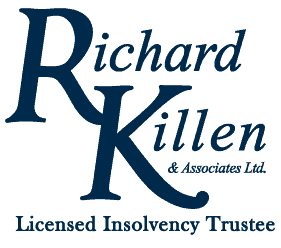A Person in Toronto Asks -Should I Go Bankrupt?
In this video, Richard Killen, a Licensed Insolvency Trustee in bankruptcy with offices across Toronto answers the question.
I don’t know how many times I have been asked by somebody during the course of the free consultation we provide to consumers at the beginning. What do you think, should I go bankrupt?
My answer is always the same for people. Its not up to me to tell you to go bankrupt.
Bankruptcy is a personal decision. What might work for one person, might not work for another person. Although what you can get from a trustee is a good idea of what is going to happen if you do a bankruptcy opposed to a consumer proposal.
So to answer the question, should I go bankrupt? My answer is you need to decide that.
What happens to my tax refund in a bankruptcy or consumer proposal in Brampton?
In this video, Richard Killen, a Licensed Insolvency Trustee in Ontario with offices in Durham region (Pickering & Oshawa) talks about whether a person’s income tax debt can be included in a personal bankruptcy in Ontario.
Something that comes as a big surprise to a lot of people is when they find out an income tax debt, an ordinary income tax debt is something that is dischargeable in a bankruptcy or can be taken care of in a consumer proposal. The people of Durham or people from across the Greater Toronto Area ask me that question numerous times. It is not a strange thing as ordinary income tax debt is treated as a debt.
There is nothing special about the fact it is a debt owed to the government. A debt to the government is not anything special in a bankruptcy situation. Therefore, in a bankruptcy in Durham or anywhere in Ontario, a tax debt is dischargeable.
If you are behind on your taxes or are have other debt problems, consider talking to one of our trustees and debt experts. We can help you review all your options for debt relief.
Contact our Durham office us for a fresh start at (905) 420-6565
Is A Payday Loan A Good Idea?
In this video, Richard Killen, a Licensed Insolvency Trustee in Bankruptcy Scarborough talks about whether a Payday loan is worth considering.
I guess one can say that going into debt, any kind of debt, is hardly ever a good idea. Usually, the cost of the debt outweighs whatever benefits you may get from borrowing the money. However, sometimes debts make a good case for making some worthwhile. For instance, is a mortgage worthwhile? Because you borrow a large amount of money for buying a house, you are going to pay back that money with interest but the house will appreciate in value. And over time that appreciation more than outweighs the cost of the debt. Maybe that kind of debt is a good idea.
Ultimately, it always boils down to whether the cost too much and how much is the cost? Now there is going to be interest on any loan and that is what you must consider. Now, unfortunately, Payday loans are on the high end of all interest calculations so one can say that it is tough to say if a Payday loan is worth it.
If a Payday loan is a part of your coping with bills, you should consider having a consultation with one of our trustees. It may be the most stress relieving call you make this year.
Is your credit rating affected?
In this video, Licensed Insolvency Trustee in the GTA area, Richard Killen, talks about the how your credit rating will be impacted by your current financial situation and is not directly due to the fact that you are undergoing bankruptcy or a consumer proposal. As a matter of fact, it is the solution you need to get out of your financial troubles and start improving your credit rating.
Here are a few key takeaways from Richard’s informative clip:
- Of course, a person’s credit rating is affected, but not so much by the bankruptcy or consumer proposal itself. It’s the non-payment of the debts that negatively affects your credit rating.
- Most people who go bankrupt or do a consumer proposal have already fallen behind in payments and their credit rating is already diminished.
- One thing for sure: the only way to restore your credit rating is by taking care of the immediate problem- and that‘s where the bankrupt or consumer proposal does the job.
- Think of a bankruptcy or a consumer proposal as the solution, not the problem.
Should you still feel uneasy about your debt and losing your assets, it’s definitely worth it to give a Licensed Insolvency Trustee a call or a visit so that they can give you all the information you will need to make this important decision and also to alleviate any worry and stress you may have.
There is no cost for your initial meeting and we will explain all of your options to you. We can meet with you during business hours or book after hours appointments if that is more convenient. Richard Killen and Associates is a Licensed Insolvency Trustee in bankruptcy Scarborough and have 10 locations across the Greater Toronto Area. Call us at (416) 285-9511
Christmas Credit Hangover
In this video, Richard Killen, Licensed Insolvency Trustee in bankruptcy in Toronto talks about buying Christmas gifts on credit cards.
It is important to remember that credit card bills don’t take a Christmas holiday. Christmas brings out the “giving” in us, especially when we have children or grandchildren. There is nothing wrong with giving, but remember, the piper will always have to be paid.
Licensed Insolvency Trustees tend to be very busy in January when the credit card bills come in. Don’t let yourself fall into that trap.
Should you find yourself in debt and your monthly bills exceed your monthly income, maybe it is time to have a conversation with Richard or one of the other trustees in bankruptcy. Call us at (416) 285-9511
Are You in Debt Denial?
 Are we just fooling ourselves.? Sure you’re carrying a balance month to month on your credit card, have car payment and a substantial mortgage on your house. But this is normal, right?
Are we just fooling ourselves.? Sure you’re carrying a balance month to month on your credit card, have car payment and a substantial mortgage on your house. But this is normal, right?
No, not necessarily. There’s a good chance you’re fooling yourself. While carrying a balance on your credit card may be par for the course these days, consumer credit rate site RateSupermarket did a poll of 6,000 Canadians and discovered that “27.5% of respondents [were] wrong in how they perceive their debt, with 22% mistakenly believing they owe less than the national average.”
According to RateSupermarket editor Penelope Graham, “Canadians want to believe their credit habits are sustainable and responsible. However, 42% of those who believe their debt is on par with the average are actually carrying more than the norm.”
The flip side of this is that 35.4% of people polled believed they had too much debt when it was actually lower than their peers.
An infographic put together by RateSupermarket points out that the average credit card debt in Canada is $2,627 and that 46% of people who believe they have normal credit card debt have balances exceeding $8,000.
Apparently it’t time for many of us to take a reality check. To overcome debt denial, it’s time to look at your real numbers in black and white. Check your credit card statements, loan papers and bills in arrears and put down on paper how much you owe whom.
You’ll be surprised. Many of us underestimate the size of our debt. Then prioritize your debts by size and urgency and start paying them off.
If you find that the size of your debt has become overwhelming, you may need some sound advice. Come in to a free first meeting at Richard Killen & Associates. We will assess your situation and give you your options.
You’ll know exactly where you stand and what you can do about it. There will be no need to fool yourself.
Do I Need to Meet My Creditors?
The last people you want to meet when going through a bankruptcy in Ontario is your creditors, right? You know, the people who have been sending you notices, phoning you non-stop, garnisheeing your wages and generally making your life difficult.
What are the chances you will have to get face to face with people who definitely aren’t part of your fan club? The chances are very small. In our experience at Richard Killen & Associates, fewer than one in 100 personal bankruptcies will require such a meeting. The creditors have the option of requesting a meeting but rarely exercise this right, especially if yours is a “summary administration” (if your assets in a bankruptcy are valued under $15,000).
That said, there are two situations where a trustee must call a meeting of the creditors: If the Office of the Superintendent of Bankruptcy (OSB) tells the trustee to call one, or if creditors who are owed more than 25% of your total debt request one.
The main purpose of the meeting is to give your creditors a chance to learn all the ins and outs of your financial situation, and to give directions to the trustee on the administration of the estate, if they so choose. The creditors can also review the trustee’s preliminary report, review the OSB’s report, examine the proofs of claims of other creditors, vote on resolutions, perhaps appoint inspectors (to provide the trustee with direction and the authority to take certain actions) and so on.
While creditors can ask you questions about your finances, you don’t have to answer any queries that aren’t related to your financial situation past, present or future. You also have the right to bring a lawyer to the meeting, though this rarely done. The chairman (usually the trustee) keeps things on topic.
But, as we pointed out before, creditors aren’t quick to request meetings in consumer bankruptcies. They can usually find out what they need to know faster and easier by calling the trustee directly or sending him/her an email. Creditor meetings occur automatically in commercial bankruptcies, where the financial issues are often more complex and more creditors are involved.
While a meeting with creditors is nothing to look forward to, a meeting with Richard Killen & Associates will help you reduce your stress levels considerably. At your free consultation we will outline all your options, so you can meet your personal situation head on and take the first steps in getting your financial life back under control.
10 Debt Danger Signals
After the expense of the holidays, many of us wonder how much debt is too much. Yes, Canadians are used to carrying record debt loads, but there comes a point where the burden may become too heavy.
Here are 10 danger signs that could reveal your spending is out of control:
1. You are making only minimal payments on your credit card balances as you head towards maxing them out.
2. Even so, you continue to use them for everyday purchases, such as groceries or gas.
3. You are using one credit card to pay off another. The fact that you have more than one or two credit cards is in itself a danger signal.
4. You borrow money to make it from one payday to the next.
5. You miss payments and due dates for bills and loans.
6. Creditors are after you for payment, threaten to sue or repossess your car, furniture or television, or hire a collection agency to recover the money for them.
7. You argue a lot with family about money, or hide your spending habits from them.
8. The size of your debt grows month after month. Or it has grown so large that you are afraid to look at the real total.
9. Extra money earned through overtime, tips or bonuses is relied on as part of your regular monthly income.
10. Thoughts about money and debt crowd out all others and put your life under a cloud.
Although your situation may be dire, it is never hopeless.
If you feel your debt load is becoming too much, come into Richard Killen & Associates for a free assessment. As a federally licensed bankruptcy trustee in Toronto, we can take you through all the possible financial coping strategies – whether it is debt consolidation, negotiating with creditors, a consumer proposal or even a personal bankruptcy – and find out what works best for your particular situation. And you make all the decisions.
After all, we’re talking about your peace of mind, right?
How To Rebuild Your Credit Rating
 Your credit rating has taken a beating. You regularly pay bills late. Sometimes you can’t make even minimum payments. Perhaps you’ve gone through a bankruptcy or the consumer proposal process.
Your credit rating has taken a beating. You regularly pay bills late. Sometimes you can’t make even minimum payments. Perhaps you’ve gone through a bankruptcy or the consumer proposal process.
But what now? How do you rebuild your credit rating?
Find Out Where You Stand
First, to see where you stand, get your sactual credit rating from TransUnion Canada or Equifax Canada.
OK, you’ve absorbed the bad news. If you’ve gone through the bankruptcy or consumer proposals process with a licensed trustee such as Richard Killen & Associates, you would have had some credit counselling sessions that would give you valuable advice about how to manage your finances and restore your credit rating.
Replace Bad Credit With Good
You would be shown, for example, how to use credit wisely. You should buy only what you can afford to pay back and make payments on time. In fact, all your bills should be paid on time.
Simple to say, hard to do. The credit counselling sessions provided by Richard Killen & Associates Ltd. will give you strategies on how to achieve this discipline.
As a credit-redeeming strategy, you might even want to purposely get a loan, though it will probably be at a high interest rate. Just borrow $1,000 or so and make sure you make your monthly payments religiously. Automatic debit from your account is probably the best way to ensure that. After six months or so you’ll be receiving an R-1 rating from this creditor. That’s a start.
But Don’t Go Overboard
The loan-on-purpose strategy notwithstanding, you shouldn’t get too much credit. The more you have available to you, the more tempting it is to use. Having too much credit can also hurt your credit report. So do not fill in too many applications for credit and loans because every time you do, your credit history is checked, which can affect your score.
Get a Secured Credit Card
A secured credit card requires you to have a balance. So, for example, if you have a balance of $500, then you might have a credit limit of $500, maybe more depending on the creditor and your arrangements. In effect, it is a no-risk or small-risk credit card. But the very act of using the card and paying your credit card bills on time will help to restore your rating.
No Minimum Payments
Get in the habit of paying your bills, especially your credit card bills, in full, rather than making a minimum payment and carrying the balance. We can’t stress this tactic too much. It is the key to good credit card management.
There are many strategies you can use to get back to financial health. The best first step could be a free consultation with a licensed trustee at Richard Killen & Associates Ltd., who will help you to understand your options in dealing with credit challenges.
Garnishee Order- How Do I Stop Wage Garnishment In Ontario?
A creditor or collection agency has placed a Garnishee Order against you, and you are wondering “how do I stop wage garnishment in Ontario?” Wage garnishments can cause a devastating blow in your life and pack a double whammy. Not only do you lose control of your finances, but you also have the embarrassment of your employer knowing that you are suffering money troubles. So how do you keep your salary in your hands?

Wage Garnishment Ontario: Who can garnish your wages in Canada?
Wage garnishment is a legal proceeding set in motion by creditors, including collection agencies, credit card companies, payday loan lenders, and the Canada Revenue Agency. Fortunately, except for the government agency, which can garnishee your wages without a court order, the creditors must take you to court and sue you to obtain a garnishee order.
What is a Garnishee Order?
This refers to a person or entity such as your employer, customer, or bank. They are ordered by the court to seize your wages or payment and surrender it to settle a claim or debt.
How much can the government garnish your wages in Canada?
Once they have the right to do it, a garnishee can take from 20% up to 30% of your gross wages. If you are self-employed, they might seize all of your receivables. If you are a contract worker, they can garnish up to 100% of your income.
However, there is a limit on how much a creditor can take from your income or bank account. The government may propose exemptions and additional protection to safeguard your earnings and bank balance for certain situations. An example of this is if you are the head of the household and have dependent children.
Can wage garnishment be stopped?
To stop this cold, or prevent it from happening in the first place, it is best to act quickly. The first step to take is to talk to a licensed insolvency trustee. A trustee can explain it all to you and make it happen. You will be happy to know that you have more than one option to stop it, not just bankruptcy.
How to stop a court-ordered wage garnishment?
One option is to negotiate a consumer proposal for you with your creditors. Even just making the official offer will stop all other legal actions related to your debts, including wage garnishment, immediately. Then, if they accept your proposal offer, it would consolidate all your previous monthly payments into just one – to the trustee – for one monthly payment that you can afford. On the other hand, if necessary, you can file bankruptcy that will stop all wage garnishments, whether the creditor likes it or not. There is one exception to this. A garnishee for child support will not be stopped.
Being garnisheed is, at the very least, an unpleasant experience. For most people, it makes it very hard or even impossible to live a normal life. It will come as no surprise when I say that a garnishee or threat of a garnishee is one of the main reasons people come to see us. They just have to do something to stop it and thank goodness Richard Killen & Associates can do that.
If you need to stop wage garnishment and bank account freeze as well as avoid payday devastation, you can talk to a licensed insolvency trustee for a free consultation and get the results you need. Remember, it may be the most stress-relieving call you ever make.
To sum up and answer the question “how do I stop wage garnishment in Ontario or stop a garnishee order?”, talk to a licensed insolvency trustee at 1 (888) 545-5365 for a free consultation.












